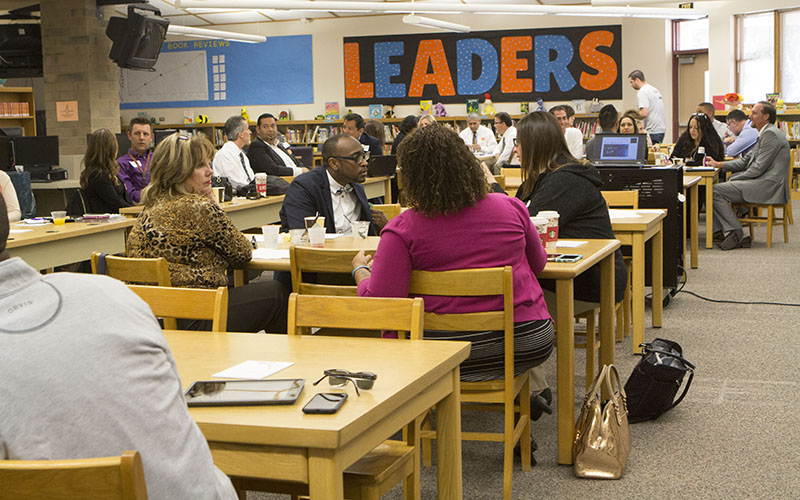
Several school administrators said sharing best practices and ideas helps them. (Photo by Paola Garcia/Cronkite News)
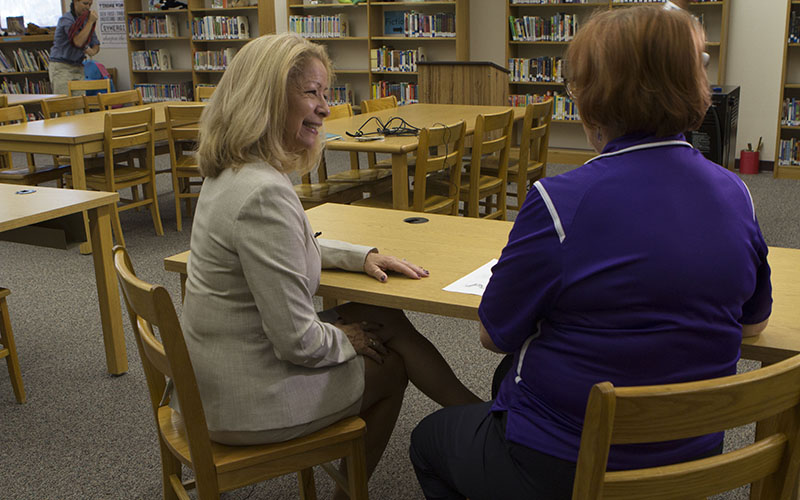
Nora Gutierrez,Tolleson Union High School District superintendent (left), said training helped her plan and organize an 100-day plan for the district.
(Photo by Paola Garcia/Cronkite News)
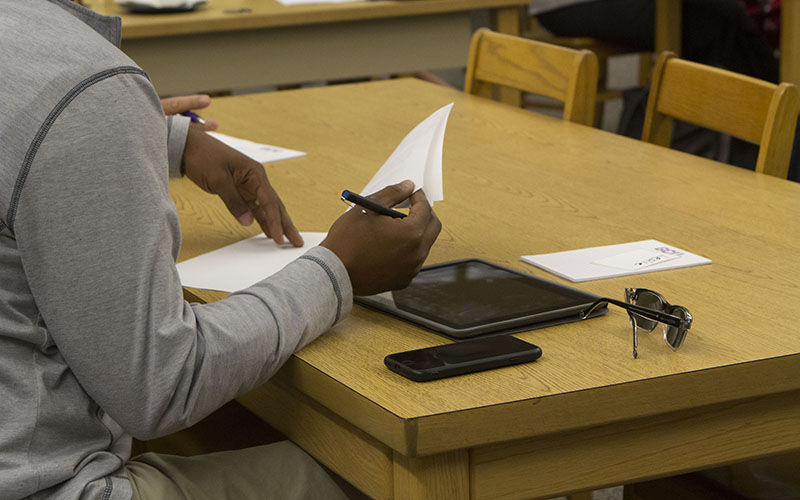
Arizona principals gathered at Mountain Shadows Elementary School for one of their regular meetings to discuss stress and conflict. (Photo by Paola Garcia/Cronkite News)
DEER VALLEY – Pleasing parents, students and community leaders who expect stellar academic achievement. Recruiting and hiring teachers in a state with one of the lowest retention rates in the nation. Planning and organizing the school year.
School administrators handle a mountain of stress and conflict as they fulfill their passion as educators.
Four times a year, Arizona principals and superintendents meet for training, mentoring, networking and sharing of best practices under the Superintendents’ and Principals’ Collaborative program. The three-year-old program is a collaboration between Grand Canyon University, the association of Arizona School Administrators and the Arizona Department of Education.
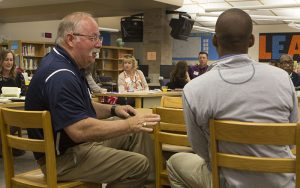
Youngker High School Principal Rob Roberson, left, has been an educator for 41 years, including 20 years as a school principal. He said he doesn’t stress much anymore. (Photo by Paola Garcia/Cronkite News)
It originally was developed for new superintendents, but has expanded to coach, mentor and develop principals. It involves administrators who are new to the profession as well as experienced professionals.
“We knew that the secret to students’ success, for students being able to reach the levels of their potential that we all aspire for them depends on great leaderships at schools,” said Jennifer Johnson, director of academic alliances for GCU.
Public schools needed the additional support after the state provided programs were no longer available. The program gives principals and superintendents, in separate trainings, the opportunity to network with colleagues so they can learn from each other.
“We provide expert information and insights based on a variety of different topics,” Johnson said.
The coaches are current or retired superintendents and principals who mentor the participants, give advice based on their experience and share best practices and successful programs to help leaders deal with challenges they may face. The meetings focus on topics such as educational excellence and new standards for state academic tests.
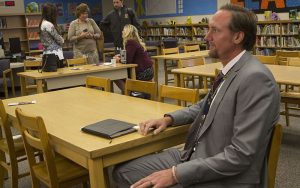
Sunridge Elementary Principal Chad Ostrom learned to meet conflict head on during training sessions. (Photo by Paola Garcia/Cronkite News)
About 78 superintendents have been through the program, with 25 superintendents added this year, Johnson said. More than 200 principals in the West Valley have participated.
“Being a principal, being a superintendent is a very stressful position,” Johnson said.
“Leaders need support.”
Johnson said 98 percent of the principals in the program have stayed in the profession.
Nora Gutierrez, superintendent of Tolleson Union High School District, said she has been an educator for nearly 35 years before she became the district administrator in 2016-17.
“The greatest achievement was being able to network,” Gutierrez said of the program, which also helped her to develop an 100-day plan.
She said her mentor in the program was always available.
“I’m very fortunate, and I would say the challenges are not within the district or within my profession…but the challenge is more nationwide,” Gutierrez said referring to the shortage of highly qualified teachers and low state funding for schools.
Chad Ostrom, principal of Sunridge Elementary School, said he appreciates getting a lot of information in a short amount of time at the quarterly meetings so he doesn’t have to be away from his campus too long.
Ostrom is learning from other administrators how to support and retain teachers and staff. One takeaway was to handle concerns as they crop up.
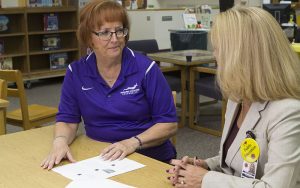
Jennifer Johnson, left, talks to Nora Gutierrez, superintendent for the Tolleson Union High School, about some ways to deal with stress during a training session. (Photo by Paola Garcia/Cronkite News)
“You just have to meet conflict head on,” Ostrom said.
Administrators joked and commiserated with one another at a training this fall at Mountain Shadows Elementary School.
“I get frustrated when someone says ‘you look stressed out,’ “said Susan Thompson, academic dean at University High School. “To me, that’s a shame statement. It says ‘you’re not handling your stuff.’ ”
Thompson said she prefers to show students they are not dealing with stress, they’re facing a challenge. That puts it under their control and their ability to fix, she said.
Youngker High School Principal Rob Roberson, an educator of 41 years, including 20 years as a principal, joked about his staff stressing out. They asked him why he is usually so relaxed. His answer: after so many years in the profession, he just doesn’t get stressed anymore.
He shared his attitude with his staff, suggesting his administrator colleagues should keep something in mind.
“We’re going to get through this,” Roberson said.